Global Flavors: Creative Stir-Fry Inspirations
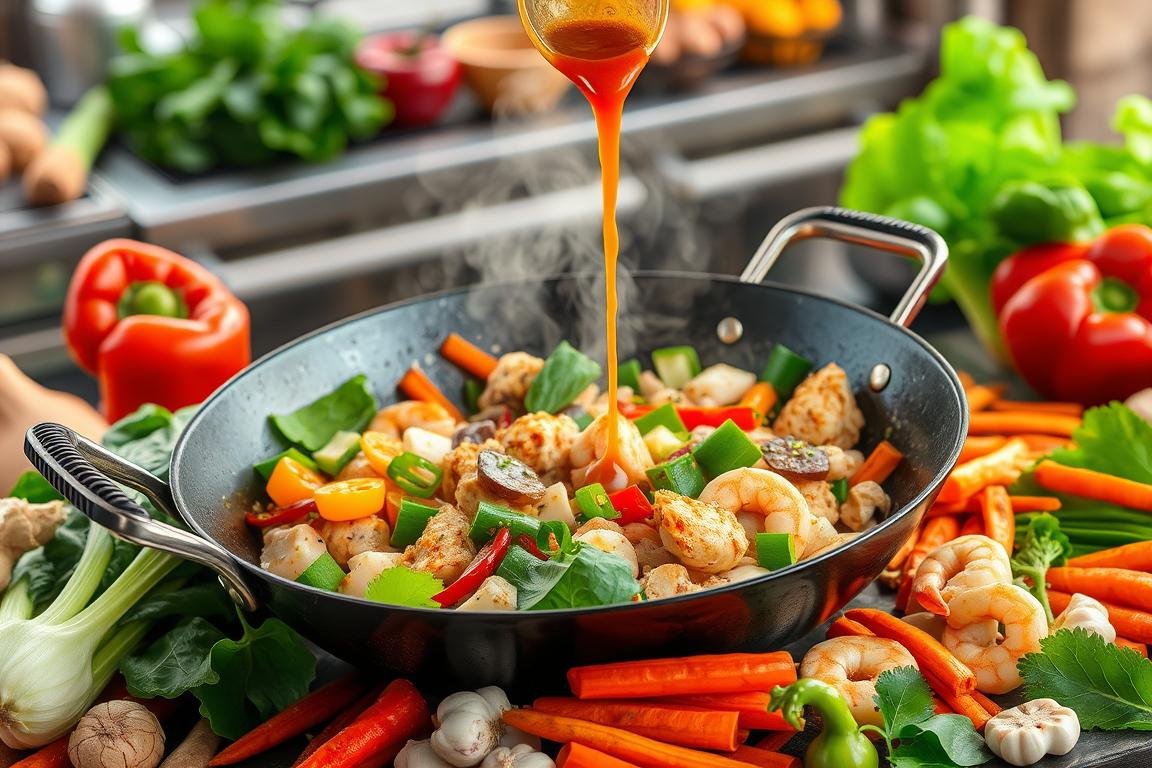
Stir-frying is not just for beginners or for making simple Asian dishes. It’s a key to a world full of rich flavors and healthy meal ideas. You don’t have to settle for boring or same-old dishes. With a little creativity, you can turn fresh ingredients into amazing meals from around the world. Learn to master your wok and high heat. This will open up a treasure chest of dishes from every corner of the globe.
Stir-frying is both traditional and modern. It’s an art and a science. By exploring beyond Asian food, you’ll find a world of flavors. These flavors tell stories from kitchens far and wide. Every stir and sizzle can bring out meals that are not just quick but also healthy. Plus, they introduce your taste buds to new tastes. This adventure is about trying different flavors and using a cooking method that has lasted for ages.
Key Takeaways
- Unlock the potential of stir-frying to swiftly create healthy, global cuisine in your own kitchen.
- Explore techniques like “wok hei” that give your dishes a distinctive, smoky flavor.
- Learn how diverse ingredients from different cultures can result in surprising culinary fusions.
- Discover the benefits of quick stir-frying for preserving the nutritional value and texture of your ingredients.
- Immerse yourself in the rich history and contemporary variations of this adaptable cooking style.
The Art of Stir-Fry: A Culinary Overview
Stir-fry is a cooking style from ancient China. It uses high-heat to create dishes with vibrant flavors and textures. This technique is both old and new, making food come alive.
What Makes Stir-Fry Unique?
Stir-fry’s fast cooking with high-heat cooking in a wok makes it special. It keeps the food’s nutrients while adding a smoky taste. This way, food cooks quickly and evenly, keeping its color and texture.
Essential Ingredients for Any Stir-Fry
Fresh veggies like bell peppers and proteins like chicken are key. They’re cut small to cook fast and even. A wok’s high sides help mix these ingredients easily.
Seasonings and sauces bring out great flavors. The cooking starts by heating the wok, then adding oil, proteins, veggies, and sauces in order. This makes a tasty stir-fry.
Cooking Techniques: Getting it Right
Great stir-fry techniques start with a hot wok. This lets chefs move food from hot bottom to cooler sides. This cooks everything just right.
Adding ingredients in the right order is key. Proteins go first, then hard veggies, and lastly, greens or noodles. This way, nothing gets overcooked.
Right oil temperature is also important. It stops food from sticking and makes it cook well. This gives dishes the best flavor and texture.
Wok cooking is an art of timing and skill. From preparing ingredients to cooking them, it’s all about getting the right mix of textures and flavors.
Classic Asian Stir-Fry Dishes to Try
Want to learn stir-frying? Try some classic Asian dishes. They’re easy and full of taste. Examples include Vegetable Fried Rice, Beef and Broccoli Stir-Fry, and Sweet and Sour Chicken. They help you learn important cooking skills.
Vegetable Fried Rice
Vegetable Fried Rice is a must-try. It’s great for a quick meal using leftovers. It mixes veggies and rice with soy sauce and sesame oil. This adds a delicious umami taste.
Beef and Broccoli Stir-Fry
Love greens and meat? Try Beef and Broccoli Stir-Fry. It mixes tender beef and broccoli in a tasty sauce. The sauce has garlic, oyster sauce, and a bit of sugar. This shows the balance in Asian (especially Chinese) food.
Sweet and Sour Chicken
Sweet and Sour Chicken shows how Asian stir-fries mix flavors. It has crispy chicken, bell peppers, and pineapple in a shiny sauce. The sauce is the perfect mix of sweet and sour.
Core Nutritional Information:
| Dish | Calories | Protein (g) | Carbs (g) | Fat (g) | Sugar (g) | Sodium (mg) |
|---|---|---|---|---|---|---|
| Vegetable Stir-Fries | 152 | 5 | 27 | 4 | 5 | 943 |
| Beef Stir-Fry | 512 | 38 | 35 | 23 | 8 | 1220 |
| Sweet and Sour Chicken | 593 | 22 | 58 | 28 | 23 | 2022 |
Using these dishes adds nutrients and Asian flavors to your meals. Enjoy veggie stir-fries or savory beef and broccoli. Each one teaches you about this flexible cooking style.
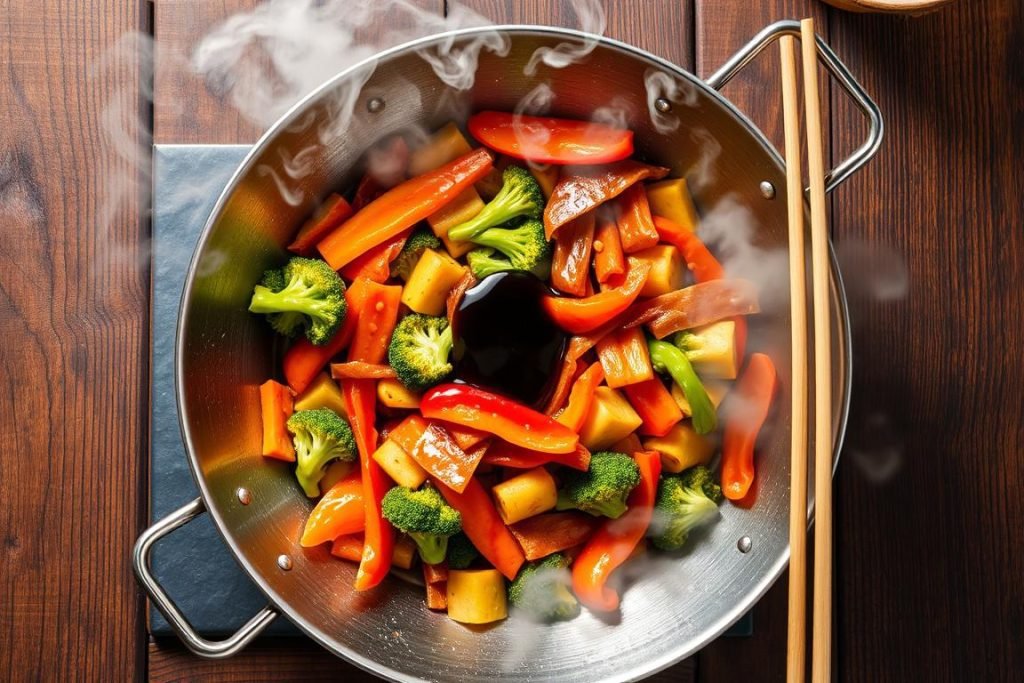
These recipes are key in stir-frying. They offer a great start to exploring this cuisine’s variety. By trying them, you’ll enjoy tasty meals and learn a healthy cooking style from Asian culture.
Flavor Fusions: Mixing Ingredients from Different Cultures
Learning Fusion Cooking lets us mix tastes from all over. Creative Stir-Fry Inspirations are key. You can blend Asian cooking with flavors from other places. This makes amazing dishes with a world of taste.
Asian-Latin Fusion: Kimchi Tacos
Think about mixing Korean kimchi’s spice with the cozy Mexican tacos. Adding things like avocado, cilantro, and lime makes it exciting. Soy sauce and sesame seeds top it off.
Mediterranean Meets East: Falafel Stir-Fry
Try crispy falafel with Asian veggies like bok choy and bell peppers. Add some soy sauce for flavor. This mix shows how Fusion Cooking works its magic.
Indian-Spiced Vegetable Stir-Fry
This mix brings Indian spices and Asian cooking together. It’s full of colorful veggies. And it’s tasty and healthy, too.
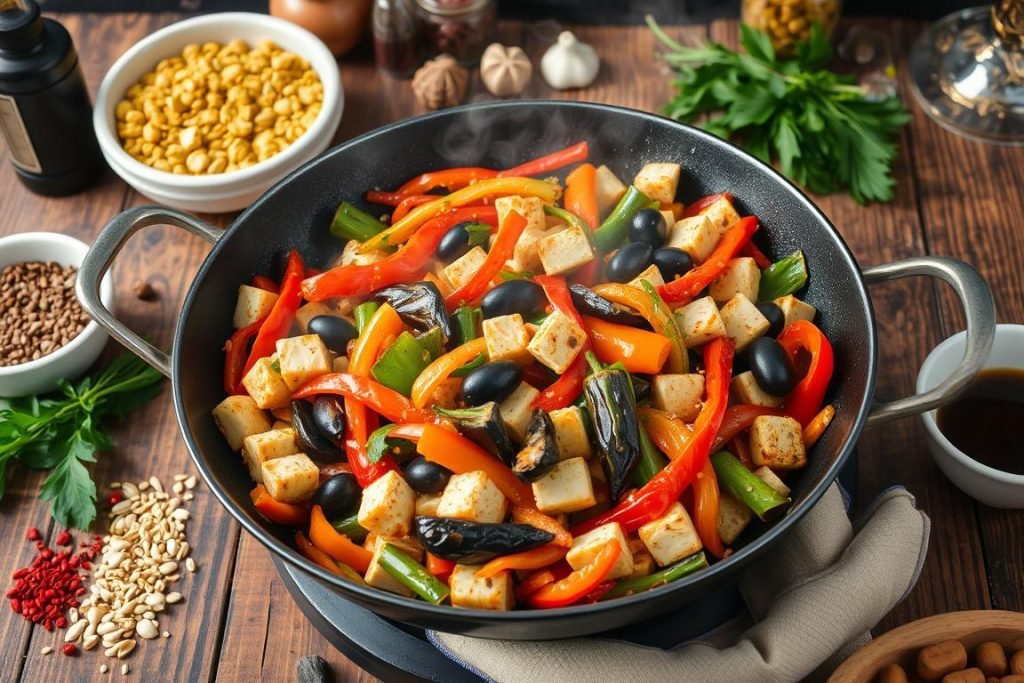
Mixing spices and ingredients can make old recipes exciting. Below, we see key parts of Asian-Latin fusion. These elements blend two cooking styles into something new.
| Ingredient | Type | Flavor Profile |
|---|---|---|
| Soy Sauce | Condiment | Salty, Umami |
| Cilantro | Herb | Fresh, Citrusy |
| Avocado | Fruit | Creamy, Mild |
| Jalapeños | Vegetable | Spicy, Pungent |
| Lemongrass | Herb | Lemony, Minty |
| Queso Fresco | Cheese | Mild, Fresh |
| Ginger | Spice | Spicy, Warm |
| Tomatillos | Fruit | Tangy, Slightly Sweet |
Fusion Cooking makes stir-fry special. It mixes cultures in a tasty way. Each dish brings the world to your table.
Healthier Takes on Traditional Stir-Fry
Healthy stir-frying is becoming popular. Simple changes make it nutritious. These include using whole grains and less oil. Now, your stir-fry can be both tasty and good for you.
Using Whole Grains Instead of Rice
Try brown rice, quinoa, or whole grain noodles instead of white rice. They’re full of nutrients and fibers. They make your stir-fry healthier and add flavor and texture.
Reducing Oil for a Light and Healthy Recipe
Traditional stir-frying uses a lot of oil. But we can use less and still make delicious meals. Use oils like safflower or avocado oil. They are healthy and have high smoke points.
Creative Vegetable Substitutions
Be creative with vegetables in your stir-fry. Use colorful veggies or spiralized versions. They add vitamins and keep calories down. And stir-frying keeps more nutrients than boiling.
Let’s look at how traditional stir-frying compares to healthier methods:
| Ingredients | Traditional Oil Usage | Healthy Alternatives |
|---|---|---|
| Protein (e.g., chicken, tofu) | Often fried with excess oil | Use minimal oil/ water sautéing |
| Rice | White rice | Substitute with brown rice or quinoa |
| Veggies (e.g., carrots, broccoli) | May lose nutrients in heavy oil | Stir-fry with little to no oil to retain more nutrients |
| Sauce | High in sodium | Use reduced sodium sauces or homemade alternatives |
Healthy stir-frying lets you enjoy your favorite meals in a new way. Your meals will be full of great flavors and good nutrients.
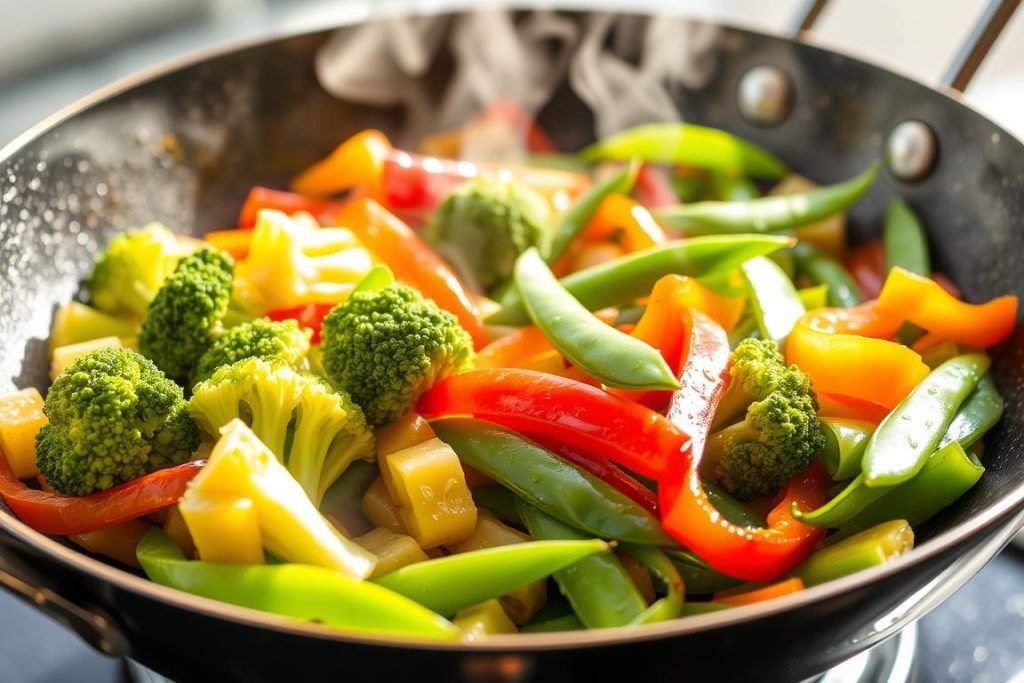
Exploring Vegan and Vegetarian Stir-Fry Options
Vegan and Vegetarian Stir-Fries are perfect for health and taste. They are full of fresh ingredients and spices. These dishes let you be creative in the kitchen.
Tofu Stir-Fry Inspirations
Tofu is great for plant-based diets, especially in stir-fries. Start by pressing your tofu to remove water. This helps it get crispy. Marinate it in soy sauce, sesame oil, and maple syrup.
Let it soak up the flavors for an hour or overnight. When cooking, keep the pan hot. This ensures the tofu crisps up well.
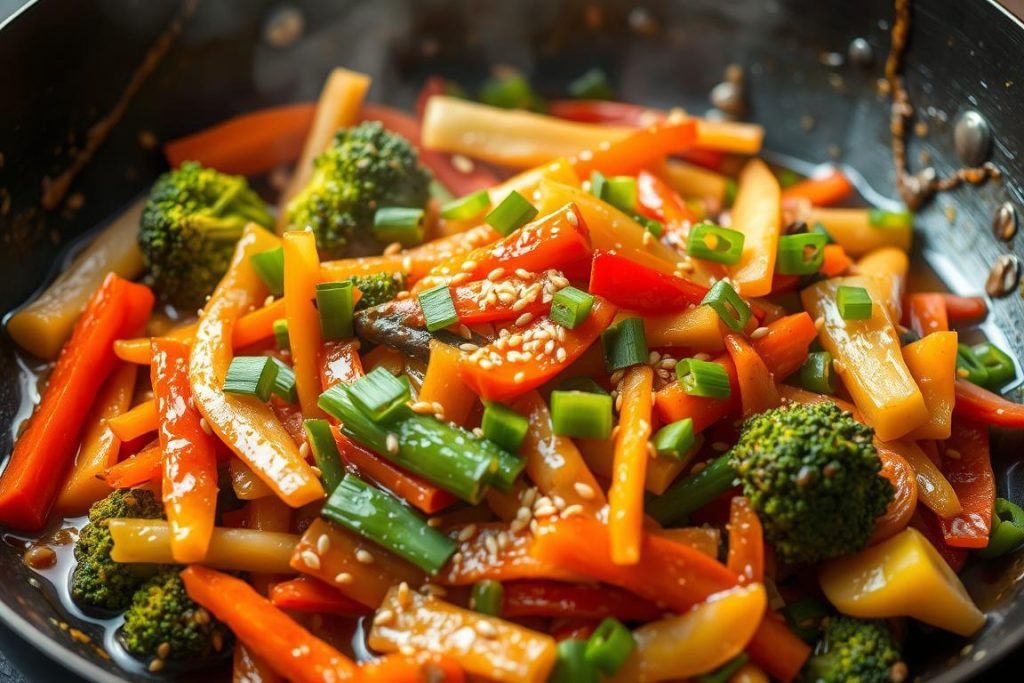
Legume-Based Stir-Fries: Beans and Beyond
Legume-based stir-fries are filling and nutritious. You can use black beans, lentils, or chickpeas. Combine them with colorful veggies for texture and nutrition. A simple sauce with garlic, soy sauce, and brown sugar adds flavor.
Simple Vegetable Combinations
A Vegetable Stir-Fry is easy and versatile. Use seasonal veggies for different flavors. Bok choy, bean sprouts, and peppers work well. Adding rice vinegar or red pepper flakes brings out the flavors.
Enjoying Vegan and Vegetarian Stir-Fries is about celebrating nature’s variety. Tofu recipes and bean mixes offer meals that are healthy for you and the planet.
Going Gluten-Free: Stir-Fry Recipes for Everyone
Starting a gluten-free diet can still be tasty and diverse. This Beginner’s Guide to Stir-Frying shows you. You’ll learn how to make a delicious Gluten-Free Stir-Fry. It’s easy with the right swaps and skills. Both seasoned chefs and new cooks will find these recipes and tips useful.
Gluten-Free Sauces to Enhance Your Stir-Fry
The sauce is key in any stir-fry. For a tasty gluten-free option, try coconut aminos. It’s sweet, salty, and has less sodium than soy sauce, which has wheat. Gluten-free tamari is another great pick. It’s thick, rich, and doesn’t cut corners on taste. Make your sauce with these, plus garlic, rice vinegar, and maybe honey or ginger. Here are some tips:
- Check labels to make sure your sauce is truly gluten-free.
- Add gluten-free spices like ginger for more flavor and health perks.
- Create your own sauces, like Yogurt Mint Sauce or Sweet & Spicy Chili Sauce, for variety.
Alternative Grains for Gluten-Free Meals
Swapping grains in your stir-fry is easy with gluten-free choices. Quinoa is full of protein and cooks fast. Buckwheat noodles are flavorful and absorb sauce well. Things to remember:
- Rice or whole grain quinoa are great for their mild taste and fluffy texture.
- Look for gluten-free noodles like buckwheat or rice noodles.
- Cook these grains just right before stir-frying to avoid mushiness.
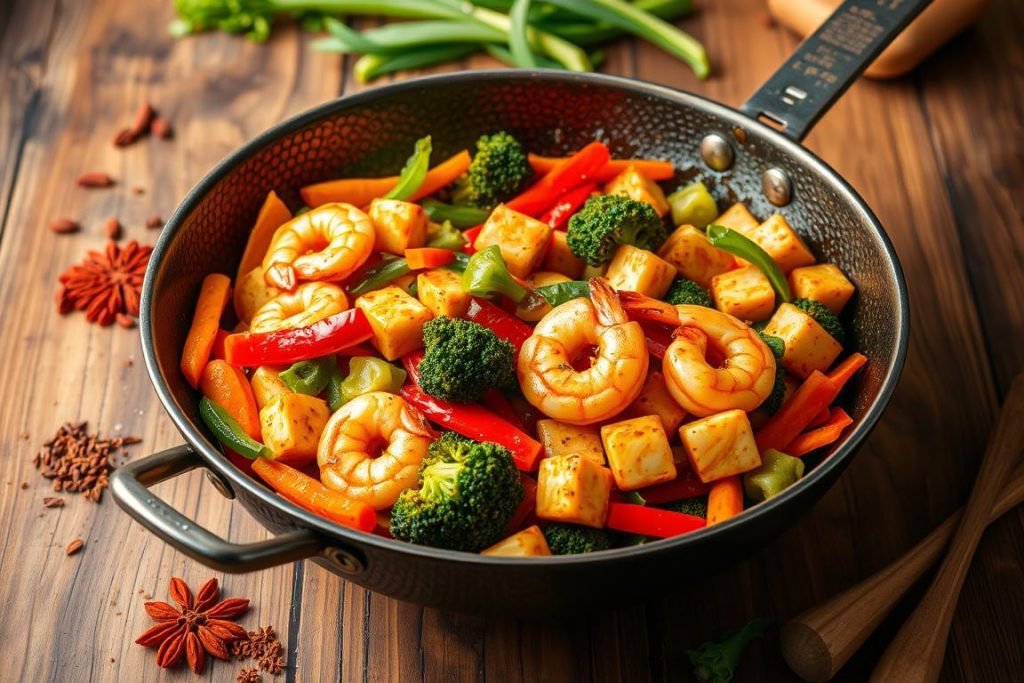
With this Beginner’s Guide to Stir-Frying, you’re ready to make tasty Gluten-Free Stir-Fry meals. Be creative with substitutes for the best flavors and textures. Have fun stir-frying!
Stir-Fry Sauces: How to Create Your Own
Making your own stir-fry sauces is a big step for any home cook. It’s also a way to get good at making healthy stir-fries. Whether it’s for a fancy dinner or a simple meal, knowing how to make stir-fry sauce can make your food better.
Universal Sauce Recipe for Any Stir-Fry
A good stir-fry starts with its sauce. Here’s a simple, flexible recipe loved by many:
| Ingredient | Quantity | Notes |
|---|---|---|
| Low sodium chicken or vegetable broth | ½ cup | Base for the sauce |
| Low sodium soy sauce | ⅓ cup | Enhances umami |
| Honey | 2 tablespoons | For a touch of sweetness |
| Sesame oil | 2 teaspoons | Adds a nutty flavor |
| Fresh ginger, minced | 2 tablespoons | Brings a spicy, fresh kick |
| Garlic, minced | 3 cloves | Delivers a pungent depth |
| Cornstarch | 1 tablespoon | Thickens the sauce |
To make it, mix these ingredients in a pan, heat until simmering, and cook till thick. This recipe is tasty and perfect for healthy stir-frying. It uses low salt parts. You can change it to fit your health needs or diet, making it great for many people.
Regional Sauce Variations to Explore
People around the world love stir-fry, and each place has its own sauce style. From the spicy Sichuan peppercorns to the sour tamarind of Southeast Asia, every area has its flavor. Changing a few ingredients can take your taste buds on a trip from Beijing to Bangkok.
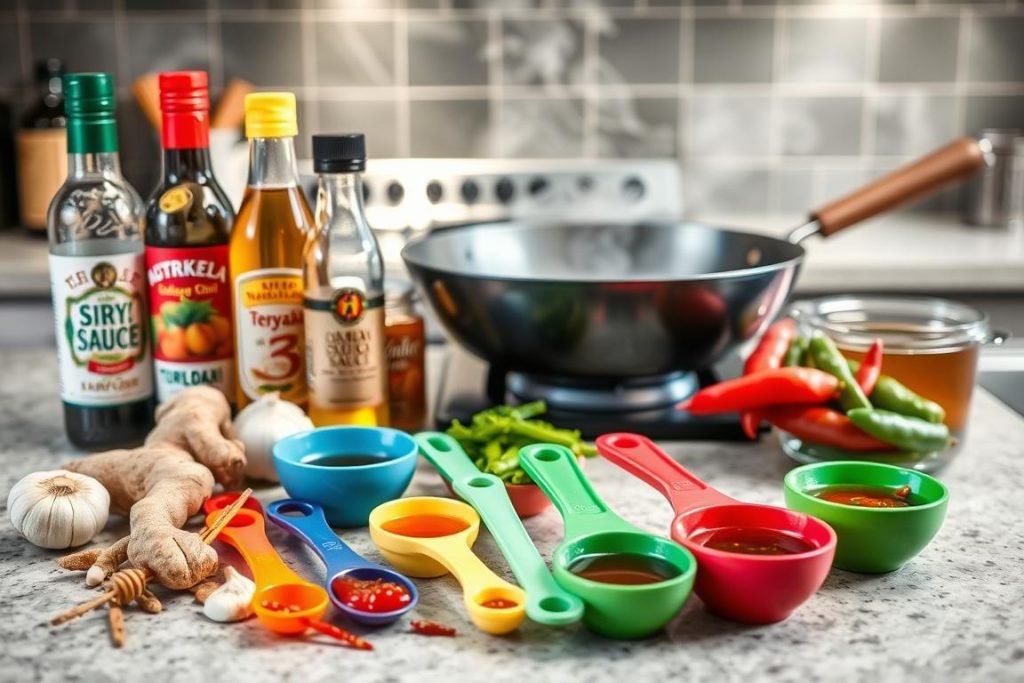
Try adding fish sauce for a Thai flavor, or use hoisin for a sweet, deep taste like in Northern China. This way, making stir-fries stays fun and teaches you about different cultures.
The best part of making your own sauce is getting to pick the flavors you like. You can use basics like soy sauce and garlic, changing things to fit health needs. Making your sauces can make your meals taste better and be healthier. Start making your stir-fry sauces today and cook with great flavor and health in mind!
One-Pan Wonders: Easy Stir-Fry Meals
Quick meals are a must on busy nights. Easy stir-fry recipes mix convenience and flavor well. They help you make tasty and healthy meals fast.

Stir-frying is great when you’re short on time. It’s quick to prepare and easy to clean up. It works well for one person or a big family.
Quick Recipes for Busy Weeknights
Try a quick chicken stir-fry with chicken breast, vegetables, and sauces. It takes 20 minutes. This method locks in flavor and offers lots of nutrients. You get 547 kcal and vitamins like A and C.
Leftover-Friendly Stir-Fry Ideas
Stir-fries make leftovers exciting again. Use leftover rice and veggies. Add soy and chili sauce for a new meal. It’s a tasty way to reduce waste.
Easy stir-fry recipes save time and taste great. They turn simple ingredients into delicious meals. You can easily make a meal that’s healthy and welcoming.
Nutritional Content at a Glance:
| Component | Amount |
|---|---|
| Calories | 547 kcal |
| Protein | 38g |
| Carbohydrates | 68g |
| Fat | 15g |
| Sodium | 1859mg |
| Potassium | 1003mg |
| Vitamin A | 9122 IU |
| Vitamin C | 78mg |
Stir-frying is a smart choice for busy nights or leftover meals. It makes dinner quick, nutritious, and easy to clean up.
Seasonal Stir-Fry Ideas: Cooking with Fresh Produce
Cooking adventures become more fun when you use colorful, seasonal veggies. They allow for tastier and healthier meals in no time. When you pick fresh ingredients for a stir-fry, you capture the essence of the season. This makes your meal special.
Spring Vegetables to Include
Spring means new beginnings and tasty, fresh veggies in your dish. Enjoy the texture of asparagus and the sweetness of snap peas. These veggies cook fast, taste refreshing, and are full of good stuff.
Fall Flavors: Embracing Root Vegetables
When it gets cooler, fall brings hearty root vegetables. Carrots, sweet potatoes, and beets add sweet and earthy flavors to your stir-fry. They’re perfect for filling autumn meals and match the season’s vibe. These veggies make your dishes comforting for chilly days.
Seasonal stir-fries mean delicious meals made quickly. They let you enjoy fresh tastes while keeping cooking brief. They’re a great way to eat according to the seasons. Plus, they keep your diet varied and healthy all year.
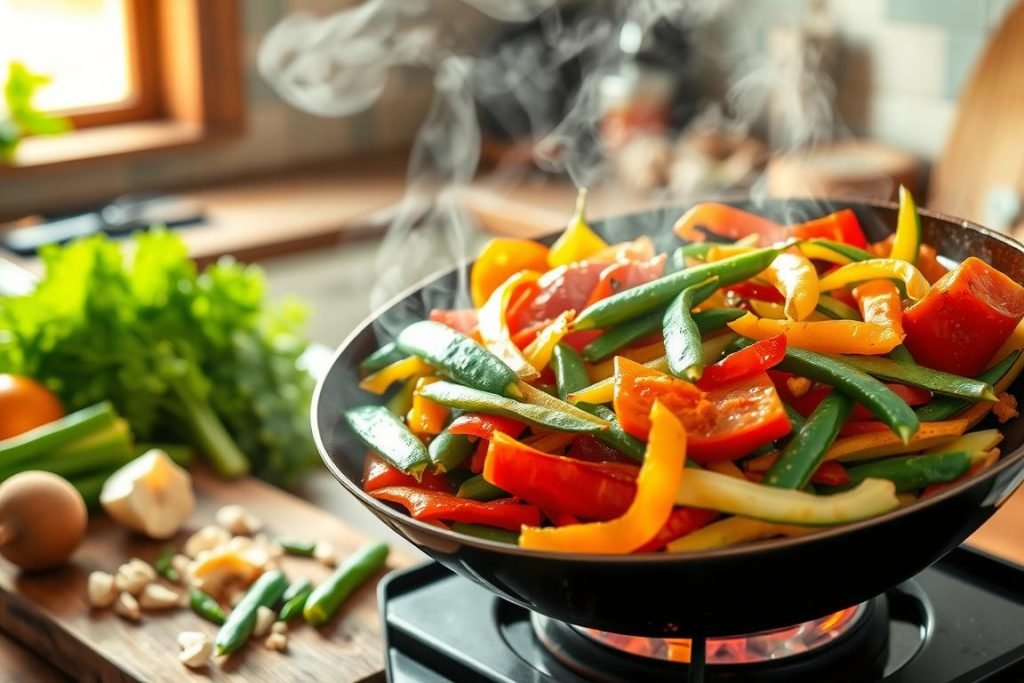
Stir-Fry for Meal Prep: Make-Ahead Tips
Learn to stir-fry and make cooking easy. You’ll have fresh, tasty meals all week. Pick the best ingredients and store them right. This keeps your food tasty and fresh longer.
Best Ingredients for Meal Prepping
It’s important to choose the right stuff for meal prep. Use chicken, beef, or tofu for protein. They stay good after cooking. Add veggies like broccoli, bell peppers, and carrots. They make your meal colorful and healthy. Also, use sesame oil for a real stir-fry taste.
Storage Tricks to Keep Flavors Fresh
Store your stir-fry right to keep it tasty. Put different parts in airtight boxes to stop them from getting soggy. Label each box with the date. This helps you remember how fresh it is. Try to eat frozen stir-fry within 3 months for the best taste and texture.
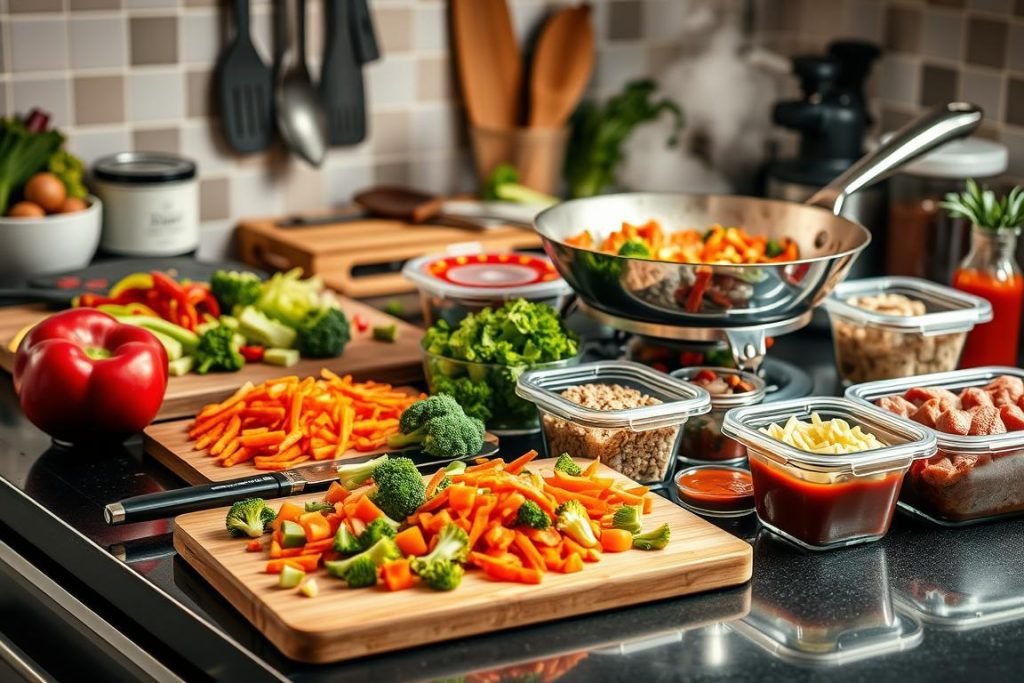
For freezing, cook meals in batches. Make packs for veggies and protein. Blanch veggies to keep them crisp. Freeze rice by itself so it’s easy to use later. This makes stir-fry quick to put together.
| Ingredient | Prep Method | Storage Tips |
|---|---|---|
| Vegetables (Broccoli, Bell Peppers) | Blanch, then cool in ice water | Freeze in airtight containers, use within 3 months |
| Proteins (Chicken, Tofu) | Cook thoroughly, cut into pieces | Store separately from vegetables, freeze if desired |
| Rice | Cook and cool | Freeze in portion-sized bags for easy assembly |
| Sesame Oil | Mix with sauce ingredients | Refrigerate, shake well before use |
Use these tips for meal prep to save time. Each stir-fry will be fresh and tasty. These meal prep and stir-frying tips will make cooking fun and easy.
Elevating Your Stir-Fry Experience: Tips and Tricks
Stir-frying is a popular way to explore Asian food. It’s healthy and you can make it in many ways. People who stir-fry often, like three times a week, see it as more than just cooking. It’s a chance to play with flavors and get everything just right. Making a good stir-fry isn’t just about cooking. How you serve it matters too. A nice presentation with the right sides can make your home meal feel fancy.
Presentation Matters: Plating Your Dish
How your stir-fry looks is important. Cut things like chicken or beef thin. This makes it cook fast and taste tender. Let your meat sit in a marinade for 20 minutes to keep it moist. And for a special touch, use high heat to add a smoky flavor. Pick oils that can handle the heat without burning. This keeps your food tasting great.
Pairing Stir-Fry with the Perfect Side Dishes
What you serve with your stir-fry matters too. Try it with jasmine rice, spring rolls, or a cucumber salad. These sides add to the taste and look of your meal. Use fresh, local chicken cut small for the best flavor. This also helps the planet. Don’t put too much in your pan. And if you add meat you’ve cooked before, just brown it a bit. This shows you know your way around a wok. Adding these ideas to your stir-fry routine can really make a difference.